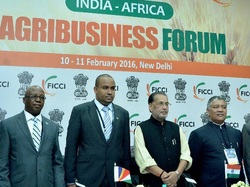Press Trust of India | 10 February 2016
Companies must explore Africa for producing pulses, oilseed: Govt of India
In a bid to address domestic shortages, Indian companies should consider investing in Africa for production of pulses and oilseeds, Agriculture Minister Radha Mohan Singh said today.
Companies must explore Africa for producing pulses, oilseed: Govt of India
In a bid to address domestic shortages, Indian companies should consider investing in Africa for production of pulses and oilseeds, Agriculture Minister Radha Mohan Singh said today.
India is dependent on import of pulses and edible oils due to a huge supply-demand gap. It imports 4-5 million tonnes (MT) of pulses and 13-14 MT of edible oils annually.
"Can we think of a dispensation where Indian companies can consider investing in Africa for growing pulses and oilseeds, which are in short supply in India. Similarly, African businesses can think of engaging mutually beneficial collaborators in India," Singh said at India-Africa Agribusiness Forum organised by industry body Ficci.
India attaches great importance to private sector participation in agriculture and agri-business. There is an impressive presence of private sector, including large business groups in food processing, logistics, supply chains including cold chains, he said.
"I am happy to note that recently our government has taken a decision to set up a food processing cluster in Africa. I am also aware that some of the Indian companies have invested in agriculture in Africa and many are looking forward to doing so," he added.
His African counterparts, especially from Zambia, Botswana and Seychelles, evinced interest to collaborate with Indian companies in various areas of agriculture sector.
"We are willing to offer 10,000-15,000 hectare on lease for 99 years. We have 75 million hectare of land, of which 58 per cent is areable. Of total areable land, only 11 per cent is used, and the rest is available for investment," Zambia Agriculture Minister Given Lubinda said.
There are challenges in Zambia but they provide opportunity for solution to global food security, he added.
Echoing similar views, Botswana Agriculture Minister Patrick Ralotsia said: "Currently, entire South Africa is engulfed in drought. Africa need not reinvent the wheel. We can learn from India and address the issues of food security." "We need to collaborate to achieve the common objective of food security. If we collaborate with India, we will benefit," he said.
Seeking partnership with Indian companies, Seychelles Agriculture Minister Wallace Cosgrow said, "We count on India on all private sector investment. Come to Seychelles to see invest opportunities in agriculture sector." India imports pulses from African countries, like Malawi and Mozambique. There is a huge potential to invest in Malawi, where almost 50 per cent of pulses area remains unused due to lack of irrigation, lack of seeds and technology and poverty.
Malawi is growing pulses in 3.5 lakh hectare, while it has 6 lakh hectare that can be used for pulses cultivation.
Investing in Africa can help India address shortage of pulses and edible oils, a Malawi trader said.
India's pulses shortage had widened last year due to shortfall in domestic output because of drought. The supply is expected to remain tight this year as well due to back-to-back drought and the government is taking measures to boost supplies through imports and creating buffer stock.
Already, the government has procured 20,000 tonnes of pulses directly from farmers for buffer stock purpose. It has also floated two import tenders for 10,000 tonnes of tur dal.
---
Business Standard | 10 February 2016
India may extend line of credit to African nations for agriculture sector
India is keen to extend Line of Credit (LoC) to least developed African countries for joint venture business initiatives in agriculture sector, Commerce Secretary Rita Teaotia said on Wednesday.
While speaking at the India-Africa AgriBusiness Forum organised by the industry body Federation of Indian Chambers of Commerce and Industries (Ficci), she said huge opportunities exist for co-operation in agriculture sector in both India and Africa.
"We hope to extend lines of credit to joint venture Agri-business initiatives in Africa to deepen our engagement in the agriculture sector particularly in LDCs (least developed countries) and thereby help to support food security in both our regions," Teaotia said.
India currently supports LDCs in trade initiatives through 'Duty Free Tariff Preference' scheme, which came into effect in August 2008. These give them duty-free access to India’s markets.
Saying that India provides 98.2% of our tariff lines (products) to LDCs, Teaotia pointed out that of the 34 LDCs in Africa, 21 countries have already begun to avail themselves of the benefits of the scheme and 13 are yet to become beneficiaries.
Under the scheme, importing of most products from least developed nations to India attract lower duties. Further, Teaotia said the Department of Commerce runs a Cotton Technical Assistance Programme for cotton growing African nations.
"Cotton is certainly an important crop in Africa as it is in India, but in many countries it continues to be exported as raw material without too much of value addition. The programme is an initiative to strengthen the cotton and textile sector in selected countries (of Africa)," she said.
She added the programme has helped in capacity building in R&D, improving post-harvest practices and has also led to far greater movement in the value chain and development in the textile and apparel sector.
Initially started in four countries -- Benin, Burkina Faso, Chad and Mali, it had been extended thereafter to Malawi, Nigeria and Uganada. “As agreed in the recent Africa Forum meet in New Delhi, it would be further expanded to Ghana, Togo, Tanzania and Zambia over the next five-year period," she said.
The Secretary also identified several areas for collaboration in agri business between Indian and African countries. These include food processing, organic farming, plant tissue culture, entrepreneurship development, capacity building for which the Government of India is expected extend lines of credit to African nations.














